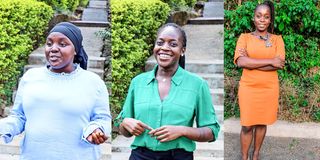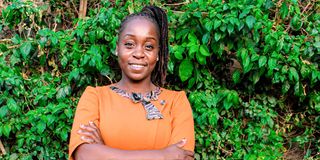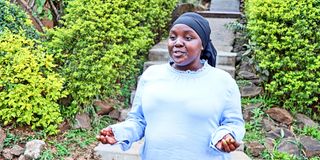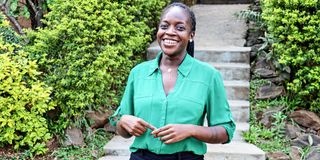Premium
Climate action: Kenya's young voices on COP29

From left: Phelister Amondi, Marylyne Wasal and Nancy Cheki.
As COP29 begins on Monday, young change makers across Kenya are mobilising their communities and amplifying grassroots solutions to address the climate crisis.
COP29 is a United Nations Climate Change Conference or Conference of the Parties of the UNFCCC, and it will be the 29th United Nations Climate Change conference held in Baku, Azerbaijan from November 11 to November 22.
Young leaders Nancy Cheki, Phelister Amondi and Marylyne Wasal, are not only responding to local challenges like waste management, rising floods, and environmental degradation, but also pushing for inclusion in global conversations.
With the spotlight on climate finance, gender equity, and youth participation at this year’s summit, they are determined to ensure their communities’ voices are heard and their ideas implemented.
From Mombasa to Nairobi and Kisumu, these climate champions are leading advocacy efforts, restoring ecosystems, and empowering vulnerable groups.
Whether through mangrove reforestation, tree-planting drives, or climate-focused art, they are proving that young people are key drivers of environmental change.
As they prepare for COP29, these change makers shared their stories with MyNetwork hoping to bridge the gap between local actions and international climate policies, ensuring Kenya’s youth and marginalised communities play a meaningful role in shaping the planet’s future.

Nancy Cheki, Program Officer, Climate Young Women’s Christian Association (YWCA), Mombasa.
Nancy Cheki, 29
Program Officer, Climate – Young Women’s Christian Association (YWCA), Mombasa
My passion for climate action runs deep, especially when it comes to ensuring that my fellow youth and marginalised communities have a seat at the table. Based on my understanding, climate change is not just an abstract issue—it affects the people I interact with daily, including women, youth, indigenous communities, and persons with disabilities. These groups are often the most impacted but are rarely included in decision-making processes. With COP29 fast-approaching, I am more determined than ever to push for meaningful participation of vulnerable communities in climate conversations. My journey into climate work began when I was studying Environmental Management and Conservation at Masinde Muliro University of Science and Technology, which I graduated from in 2018.
I noticed a gap in the inclusion of women in climate conversations, especially here in Mombasa. I would attend meetings only to find that men dominated the discussions, and the few women present were often reluctant to speak. That experience inspired me to focus on gender and climate justice, with a special emphasis on empowering women to take on leadership roles. I believe women have solutions to almost every problem, and if we tap into their potential, we can achieve lasting change. I had the opportunity to attend COP27 in person, and although I followed COP28 virtually, I noticed another challenge—accreditation for global climate events doesn’t favour women and youth.
Even with accreditation, many lack the funds to travel and participate in person. I am grateful that YWCA brings these global conversations home through pre-COP engagements. These sessions help the community reflect on the outcomes of previous conferences and prepare for upcoming ones. This way, I align my priorities with global climate goals while addressing local needs. I currently work as a Program Officer at YWCA in Mombasa, focusing on advocacy around climate policies.
My work involves engaging with communities to identify climate challenges specific to our region and ensuring that these issues are addressed through policy development and implementation. One of the biggest gaps I’ve identified is the lack of representation. Decisions about climate change often exclude the very people most affected by it. That’s why I focus on amplifying the voices of youth and women—because nothing about us should happen without us. Another major challenge is limited funding. Young people have brilliant, innovative ideas for sustainable climate solutions, but turning those ideas into reality requires resources that they don’t always have. The lack of access to technology and mentorship makes it even harder for youth like me to bring our visions to life. I believe that young people like me have tremendous potential to drive climate action. This is because we are digitally savvy, energetic, and willing to engage directly with grassroots communities. We’ve seen how digital platforms in Kenya have influenced change, and I believe youth can use these tools to push for sustainable solutions.
I also feel like the government should empower women more and encourage them to rise to leadership positions. This is because I’ve often found that women hesitate to speak up in meetings dominated by men. This makes me even more passionate about mentoring young women and encouraging them to take leadership roles in climate action. Persons with disabilities also need to be part of the conversation. For instance, during floods, people with mobility challenges struggle to evacuate to safer areas. This is why I work so hard to empower women, youth and persons with disabilities. My works also include working closely with local groups to protect and restore these ecosystems.
The organisation I work for supports them with both financial and technical assistance, and together we’ve adopted restoration sites and planted mangrove seedlings. To prevent deforestation, we’ve introduced bee-keeping as an alternative livelihood. We’ve distributed over 15 beehives to community groups, and the presence of bees acts as a natural deterrent against logging.
My goal now is to ensure that the knowledge and insights from these global forums reach the youth, women, and persons with disabilities in Mombasa. I want to help them transform ideas into practical actions that make a real impact. Climate solutions shouldn’t just be for today—they should serve future generations as well. I want to leave behind a legacy that my children and grandchildren can look back on with pride, knowing that I contributed to protecting the environment and advancing God’s work of stewardship. To young people like me, I have this advice:
Don’t be afraid to speak up! It can be intimidating to share your thoughts in rooms filled with experienced professionals, but your ideas matter. Sometimes, even the most experienced person can build on your idea and turn it into something extraordinary. Don’t work in isolation—collaborate, share experiences, and learn from others.
And, above all, take every opportunity that comes your way. Whether you succeed or fail, the experience will shape you and prepare you for the next challenge. Climate action is a collective effort, and every voice counts—especially yours.

Phelister Amondi, Co-founder, Voice of Dagoretti Community-based organization in Dagoretti, Nairobi.
Phelister Amondi, 23
Co-founder, Voice of Dagoretti community-based organisation, Nairobi
In 2022, I co-founded Voice of Dagoretti, where we use art to advocate for climate action and address social issues. My passion was sparked by the devastating effects of drought in Northern Kenya. However, I realised that I didn’t need to travel far to make a difference—Dagoretti faces environmental challenges, particularly in waste management, which leads to health problems like waterborne diseases. We mobilised youth groups and began organising monthly clean-ups to improve the environment and foster community responsibility. This initiative also connected us with organisations like YWCA, deepening our understanding of climate action. We engage with schools in environmental activities such as tree planting, guiding students on the best trees for their regions.
Art plays a significant role in our advocacy. Through poetry, murals, and performances, we communicate complex issues like mental health and climate change in relatable ways. Our group consists of 30 members; including actors, painters, and dancers; who perform at public events to raise awareness. We also create safe spaces for teenage mothers and host “Mental Health Mtaani” sessions, providing free group therapy for young people facing mental health challenges. In our environmental efforts, we’ve partnered with local groups like Dagoretti Greeners Community to implement sustainable tree-planting practices. While government initiatives like the Kenya National Climate Change Action Plan exist, many grassroots youth remain unaware of these programs. There’s a need to bridge the gap between policy and local implementation.
Attending COP28 was a transformative experience. It showed me how local efforts align with global climate goals and introduced me to funding opportunities for grassroots initiatives. African youth are often portrayed as victims of climate change, but interacting with other young leaders made me realise that we are resilient and innovative. I look forward to COP29 and will continue advocating for youth inclusion in climate decision-making processes. To fellow youth, I encourage self-education and collaboration. Opportunities exist for those willing to step up, and even small actions can create ripple effects.

Marylyne Wasal, Founder of Toto Green Space and Host of the Loud Voice Podcast.
Marylyne Wasal, 27
Founder of Toto Green Space and host of the Loud Voice Podcast, Kisumu
I consider myself a climate action champion, a journey that began after COP26 and intensified through my involvement in pre-COP27 discussions. Living near Lake Victoria, I’ve seen the devastating effects of climate change, such as rising water levels and frequent floods. My background is in communication and public relations, not environmental studies, but I’ve found a way to combine my skills with climate advocacy. A mentor encouraged me to turn from creating advertisements to focusing on climate communication, emphasising the need for accessible information for young audiences. This led to the launch of the Loud Voice Podcast, where I simplify climate jargon and update listeners on the latest developments in climate negotiations. In addition, I founded Toto Green Space to promote environmental education among children and youth.
I noticed that schools treat environmental activities as low-priority, and practical engagement is often missing. My initiative partners with four schools in Kisumu County, working with Friends of Sango, to introduce climate-smart agriculture and gardening. I aim to change the narrative around environmental care, teaching children that it is a responsibility not a punishment. While public schools are often underfunded, and some administrators are reluctant to participate without incentives, I remain committed to expanding my reach. I believe early environmental education is crucial for fostering lifelong environmental stewardship. Participating in national climate processes, such as the development of Kisumu’s County Climate Action Plan, has been a highlight of my journey.
I look forward to attending COP29, especially the discussions on climate finance, as we transition beyond the Sh129 billion annual pledge. When it comes to youth and women’s involvement in climate action, I feel it’s growing, but more needs to be done to ensure meaningful participation. The recent Local Conference of Youth (LCOY), which I attended in Mombasa, provided an opportunity for us to present our demands for COP29, and I am optimistic that our voices will shape the conference’s outcomes.
To young people, I emphasise the importance of starting early and taking advantage of every opportunity. Environmental education must be practical and well-funded, and my goal is to ensure that more children grow up with the knowledge and tools to protect the planet.





